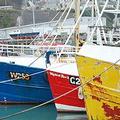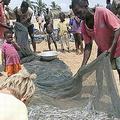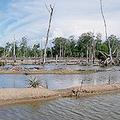 聯合國日前發表一份報告顯示,開發中國家仰賴漁業的社群特別容易受到氣候變遷的衝擊,因此產業界和國家漁業管理機構應該要對上升的氣溫更加瞭解並對其做好準備。
聯合國日前發表一份報告顯示,開發中國家仰賴漁業的社群特別容易受到氣候變遷的衝擊,因此產業界和國家漁業管理機構應該要對上升的氣溫更加瞭解並對其做好準備。
聯合國糧農組織在3月2日發表該份《世界漁業與水產業現況》報告指出,負責任的捕撈措施需要推展得更廣,而管理計畫應該要包括應對氣候變遷的策略。
「最佳經驗只有留在書上,而缺乏實行,但是這些在書上清楚的工具足以讓水產業更有彈性地應對氣候變遷。」報告的作者之一柯屈瑞(Kevern Cochrane)表示。
「因此對漁民和水產業的訊息很明確,應用現有的最佳經驗,例如糧農組織的負責任水產的行為準則,這樣就是已經對氣候變遷採取了重要的應對措施了。」
由80個國家來的代表本週在羅馬參加糧農組織水產委員會的年會,在會議中會討論在這份報告中提及的問題,以及未來該委員會的工作重點。
聯合國糧農組織的報告指出,公海漁業的永續性很重要,但是養殖業的產出現在佔了人類海鮮食用量的47%。「許多水產養殖場已經到達其產能的極限了,」柯屈瑞表示,「當你看到氣候變遷對海洋生態系所造成的影響時,需要更擔心的是生態系要怎麼承受。」
目前已經達到最高產能極限的魚場,分別是東北大西洋、西印度洋和西北太平洋。水產養殖業持續是快速成長中的動物食品產業,並提供了世界上一半的魚肉消費量,再加上未來發展應該是由孵卵開始的養殖法,以減少對野生魚群的依賴。
由於水產養殖看似全球未來海鮮產出的基礎,世界自然基金會(WWF)對這份報告的回應是呼籲水產養殖業應該要以更永續的方式經營。世界自然基金會也警告改為依賴水產養殖也可以視為減少對脆弱的海洋捕撈漁業的壓力。
一系列與養殖業的對話機制,正在促成減少環境和社會衝擊的全球漁業養殖標準,這個機制是由世界自然基金會所協辦,邀請2000多位的水產農夫、非政府組織和科學家參加,這套標準將首先關注於12種具有最高經濟價值和環境衝擊的魚種開始。
養殖漁業的對話現在更考慮這個標準是否由水產養殖業管理委員會(Aquaculture Stewardship Council)來管理,這是一個類似於海洋管理委員會的組織,在海洋捕撈漁業裡是領先的永續認證系統。
世界自然基金會(WWF)欲核發12種高經濟鱼種的其中一種──養殖蝦證照,然而提案卻遭到國際間非政府組織的反對。
來自非洲、亞洲、歐洲、拉丁美洲與北美洲等17個國家的地方社群、非政府組織、社運團體與研究人員,共同於2007年9月簽署了一項聲明,反對印尼蘭龐省(Lampung)的海蝦養殖產業。
 他們警告,若將濕地與紅樹林改建成為蝦塭,將釋出原本儲存在土壤內的碳,而原先紅樹林固碳的功能也會喪失,進而令氣候變遷加劇。
他們警告,若將濕地與紅樹林改建成為蝦塭,將釋出原本儲存在土壤內的碳,而原先紅樹林固碳的功能也會喪失,進而令氣候變遷加劇。
紅樹林的樹木生長在陸地與海交界的潮間帶與河口處,其延長樹根能夠作為魚類幼苗的庇護所、使海岸線免於颶風、巨浪與海嘯等侵蝕。
這些非政府組織表示,儘管有大量證據顯示蝦塭將對海岸生態系與當地居民產生極大的衝擊,但蝦養殖業仍持續擴張至新的土地與國家,如巴西、奈及利亞與肯亞等地,留下地力耗竭的土地與貧窮的居民。
2008年秋季,由美國「紅樹林行動計畫」(Mangrove Action Plan)、孟加拉「反工業化水產養殖亞洲團結聯盟」(Aisa Solidarity Against Industrial Aquaculture)、哥倫比亞「非洲紅樹林網」(African Mangrove Network, RedManglar)、英國「森林人計畫」(Forest Peoples Programme)等團體領導,協同其它非政府組織,在厄瓜多與泰國兩場世界自然基金會舉行的水產養殖會談中,表達對此議題的關切之意。
他們持續要求「這破壞社會與衝擊環境的產業應停止進一步擴張」,並中斷世界自然基金會「水產養殖業管理委員會」(Aquaculture Stewardship Council)的行動。團體聯盟表示他們將2月份提案的水產養殖業管理委員會視為「國際大型非政府組織的又一次嘗試,以不健全的計畫,處理養殖蝦塭無法永續經營的問題。」
團體聯盟還提到「這項議題仍需要嚴格的社會規範與以權利義務為基礎的標準,而不只是在蝦溫層級的環境與技術問題。」該聯盟正尋求與「遭受影響的社區誠心地進行有意義的對話,而不只是與企業和少數非政府組織、學界交換意見。」
 世界自然基金會美國水產養殖計畫(US Aquaculture Program)代理主任史瓦茲(Jill Schwartz)在訪談中作出回應:「我們對養蝦業與其他所有水產業職業的看法是,這是必須持續經營的產業。現在水產養殖是全世界發展最快速的食物生產系統-我們在世界上吃的魚有半數是養殖魚。」史瓦茲表示:「我們與該聯盟一樣,了解養殖業對環境有些負面的衝擊,因此我們正與企業界制定作業標準。」
世界自然基金會美國水產養殖計畫(US Aquaculture Program)代理主任史瓦茲(Jill Schwartz)在訪談中作出回應:「我們對養蝦業與其他所有水產業職業的看法是,這是必須持續經營的產業。現在水產養殖是全世界發展最快速的食物生產系統-我們在世界上吃的魚有半數是養殖魚。」史瓦茲表示:「我們與該聯盟一樣,了解養殖業對環境有些負面的衝擊,因此我們正與企業界制定作業標準。」
史瓦茲說:「養殖業者希望在這個產業中見到改變,他們也願意為了保護環境而改變養殖方式。參與養殖會談的人員已經發現幾項關鍵作用,希望藉此減少蝦塭鹹水滲入地下水造成的水汙染;減少使用化學物質與抗生素;降低資然棲地的破壞與紅樹林的砍伐。」
Fishing-reliant communities in the developing world are vulnerable to climate change, so the fishing industry and national fisheries authorities must do more to understand and prepare for rising temperatures, says a new United Nations report published Monday.
The UN Food and Agriculture Organization's report "State of World Fisheries and Aquaculture," says existing responsible fishing practices must be more widely implemented and management plans should be expanded to include strategies for coping with climate change.
"Best practices that are already on the books but not always implemented offer clear, established tools towards making fisheries more resilient to climate change," said report co-author Kevern Cochrane.
"So the message to fishers and fisheries authorities is clear," he said. "Get in line with current best practices, like those contained in FAO's Code of Conduct for Responsible Fisheries, and you've already taken important strides towards mitigating the effects of climate change."
Representatives of 80 countries are in Rome this week for the annual meeting of the FAO Committee on Fisheries where they are discussing the issues raised in the new report and the future work of the agency.
Sustainability of the high seas fisheries is crucial, but it is aquaculture that now accounts for 47 percent of all fish consumed by humans as food, the FAO reports.
"Many fisheries are being exploited at the top range of their productive capacity," said Cochrane. "When you look at the impacts that climate change might have on ocean ecosystems, that raises concerns as to how they'll hold up."
Areas with the highest proportions of fully-exploited fish stocks are the Northeast Atlantic Ocean, the Western Indian Ocean and the Northwest Pacific Ocean.
Aquaculture continues to be the fastest-growing animal food producing sector and is poised to provide half of all fish consumed worldwide, finds the FAO report, adding that future developments should move towards hatchery-based aquaculture, cutting dependence on wild stocks.
With aquaculture set to be the basis of all future growth in global seafood production, the global environment organization WWF responded to the new report with an urgent call to put aquaculture on a more sustainable basis.
The shift to aquaculture is as likely to increase as to reduce the pressure on collapsing ocean fisheries, WWF warned.
A series of aquaculture dialogues, coordinated by WWF and involving more than 2,000 farmers, nongovernmental organizations and scientists are currently creating global standards to minimize environmental and social impacts associated with aquaculture - initially for the 12 species with the greatest economic and environmental impact.
The aquaculture dialogues are now considering whether the standards should be administered by an Aquaculture Stewardship Council - a body similar to the Marine Stewardship Council, the leading sustainability certification system for marine capture fisheries.
The WWF proposal to certify farming of one of the 12 species - shrimp - is opposed by an international NGO network. Representatives of local communities, NGOs, social movements and researchers from 17 countries of Africa, Asia, Europe, Latin America and North America signed a declaration against industrial shrimp aquaculture in Lampung, Indonesia in September 2007.
They warn that conversion of wetlands and mangrove forests into shrimp ponds contributes to climate change by releasing stored carbon in the soil into the atmosphere and by nullifying the mangroves' function of sequestering carbon.
With long roots that shelter juvenile fish and protect coastlines from erosion, hurricanes, storm surges, and tsunami, mangrove trees grow in the intertidal areas and estuary mouths between land and water.
Despite the overwhelming evidence of its devastating effects on both coastal ecosystems and local peoples, the NGOs say, the shrimp farming industry continues to expand into new lands and countries, such as Brazil, Nigeria and Kenya, leaving behind degraded land and impoverished communities.
Led by Mangrove Action Project, USA; Asia Solidarity Against Industrial Aquaculture, Bangladesh; African Mangrove Network, RedManglar, Colombia; and Forest Peoples Programme, UK, these and other NGOs expressed their concerns at two WWF aquaculture dialogues last fall in Ecuador and Thailand.
They are still demanding "a moratorium on further expansion of this socially disruptive and ecologically destructive industry" and a halt to the WWF's Aquaculture Stewardship Council initiative.
These groups said last month that they view the proposed Aquaculture Stewardship Council as "yet another attempt by a big international NGO to formulate some ill-conceived plan to remedy the problems of unsustainable industrial shrimp farming."
Saying that there "still is a great need for strict social and rights-based standards, not just environmental and technical fixes at the shrimp farm level," they are seeking "real and meaningful dialogues with affected communities, not just with industry and a few NGOs and academics."
In response, Jill Schwartz, deputy director of the WWF-US Aquaculture Program, told ENS in an interview, "Our feeling with shrimp and all aquaculture is that it is here to stay. Aquaculture is the fastest growing food production system in the world right now - half the fish we eat on the planet is farmed."
"We, like that coalition, recognize that there are some negative environmental impacts assocated with aquaculture, so we are working with industry to set these standards," said Schwartz.
"Producers want to see some change in the industry," said Schwartz. "They are willing to change farming practices to protect the environment. Shrimp dialogue participants have identified some key impacts they want to try to minimize - water pollution, salt water from shrimp farms can seep into the groundwater; chemicals and antibiotics; destruction of natural habitat; and the clearing of mangrove forests."





